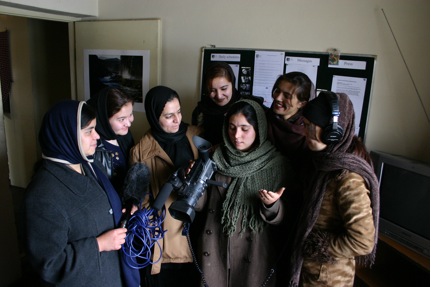Credit this group for Afghanistan's burgeoning media industry


KABUL -- Brajesh Verma, an Indian entrepreneur working in Afghanistan, came to the war-ravaged country in 2004 with two goals in mind: to help strengthen the media scene here as well as contribute in some way to improving the social lives of the Afghans.
Verma got involved in Aina, a non-profit group, which was started by renowned French photographer, Reza (who only goes by his first name), in 2001. Its goal is to educate Afghans, especially women and children, by teaching them communication and information skills.
Aina's free training in several platforms including radio, video, photography, printing and designing prepares Afghan youth to find jobs in the media and entertainment industry. The group has now trained more than 2,700 Afghans who found work in more than 15 media companies including BBC and Al Jazeera.
Verma, who now heads the country's operations, noted that there were only two television stations in the country when he first arrived in 2004. But presently there are at least 35 television stations and 90 radio stations. Since 2001 when the Taliban regime were ousted from power following the U.S. invasion, the media and entertainment industry, he said, had "grown like anything," proving one bright spot in a country where unemployment is high (estimated to be 35 percent in 2008, according to the CIA World Factbook), and few job opportunities exist in the private sector.
The number of unemployed is expected to rise as the U.S. Army closes its bases in preparation for its 2014 exit, and as private contractors in areas such as catering and transportation close shop in the wake of the Americans' departure. There is already concern that unemployed youth would be sucked into crime and violence especially if the transition of power to the Afghan security forces becomes chaotic.
But Verma, who has previously done media training in countries like Rwanda and Bosnia, which have also experienced intense conflict, is confident that the media industry can thrive and grow in a dangerous and chaotic environment as well, and remain an avenue of employment for locals.
This is a relevant contribution because the International Labor Organization in its 2012 report on Afghanistan, highlighted both unemployment and underemployment as "intractable problems," while underlining the need for "productive and decent job opportunities."
While Aina's aim is to prepare Afghans for media jobs, the organization also attempts to make them more aware about the country's social problems through its own activities like documentary filmmaking on issues like women's rights and the need to follow the law. The idea here is that Afghans will look for more meaningful work that helps better their own country -- as Verma puts it, "good" jobs.
Media training in these areas also has different rules. In Afghanistan, for instance, three decades of war have left the majority of population without a good education. “They are slow to pick up on theory. They do not process it. So we focus only on practical stuff,” said Verma.
Aina, too, has seen hard days in Afghanistan. In the first rush of the U.S. victory against the Taliban, Aina benefited from generous international funding. In the next five years, however, mismanagement and lessening of funds made it difficult for the non-profit to sustain itself.
To save Aina, Verma along with some of his Indian colleagues decided to transform it into a business venture as well as kept its non-profit activities running. The business part involved providing media services in Afghanistan like making documentaries for non-profits, the United Nations, the U.S. army and the Afghan government. The money they made was channeled back into providing Afghans training.
“So, we no longer depended on donations but got our own funds,” said Verma. “We made it self-sustainable. This is a social business.”
To counter Aina's reputation of a failing venture in order to secure projects and funding, Verma said, that it became vital for them to build trust and goodwill to get projects. So in 2005, Verma organized the first music concert in Afghanistan, which was held in the infamous football field once used by the Taliban for carrying out public executions. He managed to get the hugely popular Bollywood singer, Sonu Nigam, to perform for the Afghanis –- many of who love Indian movies and songs.
Aina also created the country’s first television series for $1 million. Funded by the U.S. Army, it was a family drama aimed at increasing public knowledge about the country’s laws through plots dealing with property matters and divorce.
Two years later, Aina did a series, which cost $285,000, for promoting birth control and family planning. And now, Verma is working on a series that deals with corruption, “because corruption is more dangerous for this country than the Taliban,” he said.
In the making of these series, Verma also involves a good number of Afghanis who have been trained by the group, which allows them to understand the various social problems confronting their society -- especially gender empowerment. Women were not allowed to work or attend school under the Taliban regime. After 2001, women have made gains in both these areas. But a traditionally conservative society and security concerns continues to deprive them of many basic freedoms in both personal and professional spheres.
Verma said that in both his series, the lead characters were female.
The main role in the new show is also of a female judge. The entrepreneur tells a funny story about how his colleague went to court to see what female judges wears, but found out none exist in the country. “People in the court were surprised at the question,” he said. “But since they aren’t any, we have designed our own costume. Perhaps, that will begin their uniform once a woman becomes a judge here.”
Photos: Courtesy of Aina
This post was originally published on Smartplanet.com